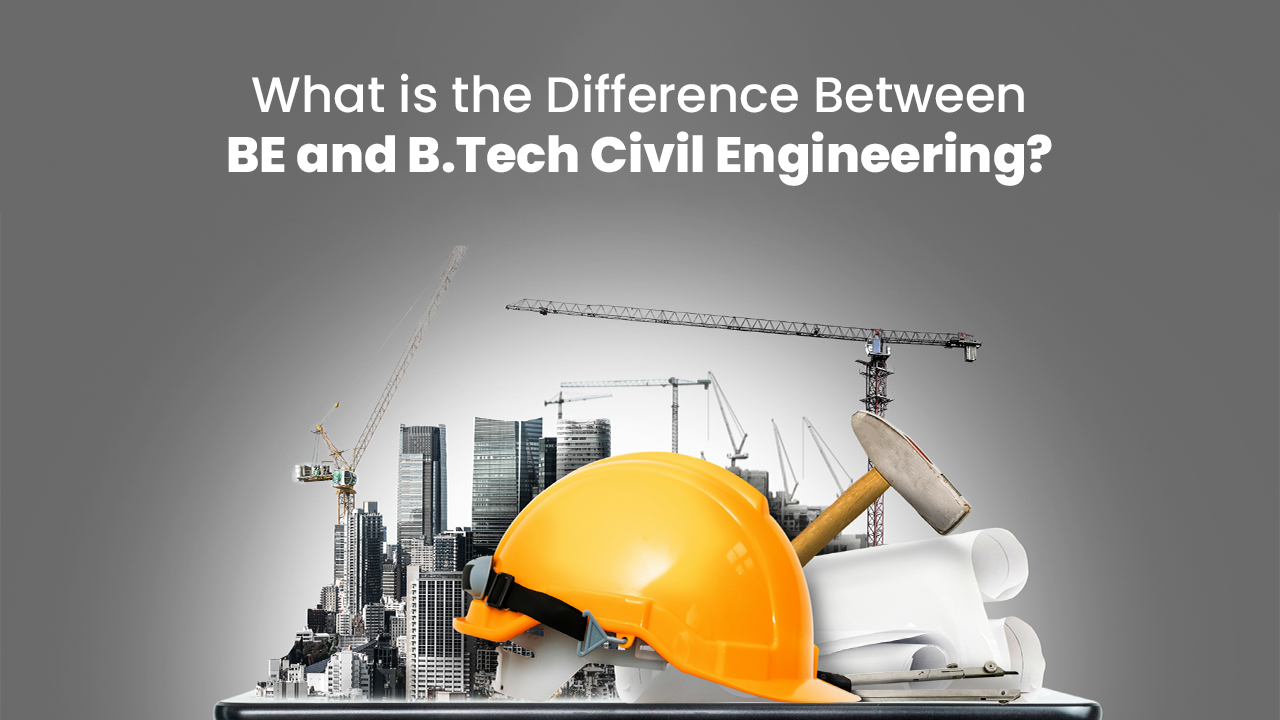
Science students who wish to take admission into Engineering face a particularly interesting issue. At the undergraduate level, the top engineering colleges in Solapur and India offer Bachelor of Engineering and Bachelor of Technology degrees. Known as BE and B.Tech for short, these two degrees are quite similar to each other yet quite different as well.
Universities like Terna Osmanabad offer B.Tech at the bachelor’s level to their Engineering students. How does a student from here differ from another student with a BE degree in the same specialisation? Let us explore that.
Difference between BE and B.Tech Civil Engineering
At the onset there are not many differences between the Bachelor of Engineering, BE and the Bachelor of Technology degrees. However, there are some differences that must be explored in order for students to make a better decision between both. These differences have been outlined below.
| BE in Civil Engineering | BTech in Civil Engineering |
| BE concentrates on teaching knowledge or theory of any subject, Civil Engineering in this case. | BTech degrees are more about teaching practical skills to work in a particular field. |
| Most Engineering colleges in Osmanabad and India that have BE degrees also offer degrees in Arts, Finance and other streams. | B.Tech degrees are generally offered in specialised Engineering institutes that are under private or public administration. |
| Some BE degrees in Civil Engineering do have internships and also industry visits during the course of the degree. | For a B.Tech degree in Civil Engineering, industry visits and internships are mandatory in order to graduate. |
| Since the BE degree is more knowledge-heavy, the course curriculum could not be updated as regularly to match industry standards. | As the B.Tech degrees are skill and technology-based, the course curriculum is regularly updated. This is also mandated by the approving and accrediting organizations. |
| To enrol on the BE degree, candidates must have done their class 12th in the Science stream with at least a 50% score. Candidates may or may not be required to attempt a national or state-level entrance test. | B Tech colleges in Maharashtra and India also require their applicants to have completed their class 12th in Science and a minimum 50% aggregate score. However, for a B.Tech degree, a JEE score is necessary. |
Similarities between BE and B.Tech Civil Engineering
If there are differences between any two factors, there will also be similarities. The same is the case with BE and B.Tech degrees in Civil Engineering. The similarities between both of these degrees if one were to look into applying to both at one of the many top engineering colleges in Maharashtra.
- Firstly, the All India Council for Technical Education or AICTE does not differentiate between both BE and B.Tech degrees. The council has given both degrees equal status.
- Both the Bachelor of Engineering and Bachelor of Technology take four years to complete or eight semesters in total. This also includes the mandatory internship period for the B.Tech degree.
- Job opportunities for both a BE and B.Tech graduate are the same. Students with either degree can apply for the same civil engineering job.
- Besides placements and jobs, BE and B.Tech students are also eligible to apply to higher education. Their postgraduate counterparts are Master of Engineering and Master of Technology. The scope and future career path for both degrees are bright.
BE and B.Tech in Civil Engineering: Jobs
As mentioned, BE and B.Tech degree holders can apply to and interview for the same job positions. What are some of the top profiles for Civil Engineering for a student from a BE or BTech colleges in Solapur? Let us read below.
Civil Engineer: The term Civil Engineer is an umbrella term that can change as per the industry one is working in. Generally, these engineers are a part of large-scale construction projects. From the design and planning stage to building and testing, the Civil Engineer will oversee all. Most Civil Engineers are hired to work in the public sector helping build roads, buildings, bridges, water transport systems etc. One of the more well-paid Engineering specialisations, Civil Engineers make around INR 3,10,195 LPA.
Structural Engineer: Per the name, Structural Engineers are experts in creating sound and strong structures. These structures could be new buildings, pipelines, dams or a bridge. Like Civil Engineers, Structural Engineers manage all roles in a project. For instance, planning, designing, supervising, corrections and also updating additional projects. Structural Engineers can work full-time with a construction organization, with the Government or on a contractual basis and earn around INR 4,88,094 LPA.
Water Resource Engineer: Water Resource Engineers are responsible for the water systems and for meeting the water needs. For this role, one needs to do a bit of analysing beforehand to understand what needs to be exactly done. Thereafter, the engineer plans and designs what pipelines, treatment plants and pumps are to be installed. It is due to the efforts of the Water Resource Engineer that citizens get access to clean and safe drinking water. Indian Water Resource Engineers earn around INR 4,20,000 LPA.
Environmental Engineer: As the earth becomes more crowded, the pollution levels become alarming. For this reason, the role of an Environmental Engineer was introduced. They typically oversee waste management and pollution control techniques. For their work, they stay up-to-date with the latest rules and regulations regarding environmental pollution. Thereafter, they will create reports to be submitted to higher-ups that are used to make necessary decisions. Recruiters pay INR 4,46,282 LPA to Environmental Engineers.
Transportation Engineer: Having efficient transport systems is crucial for the success of an economy. This is why Transportation Engineers are much in demand. Per their title, they work on designing and creating new transportation systems and infrastructures. Here, transportation can be both public and private. For instance, some projects this engineer will help create are trains, airports, railway stations, highways, walkways, bridges etc. This is a monumental role that needs to be structurally sound and safe. For this, Transportation Engineers earn around INR 4,50,000 LPA.
As evidenced by our write-up here, there is not much difference between a Bachelor of Engineering and a Bachelor of Technology in Civil Engineering. The key difference is in the approach to teaching the curriculum. Graduates from both degrees go on to work in illustrious jobs and are also eligible for the same higher educational degrees. Choosing between them would be up to personal factors and the future aspirations of the candidates.
To get an advanced degree in a civil engineering discipline, you should enrol at TERNA Engineering College. They have the best faculty, the best placement drive and numerous internships for civil engineering students.

